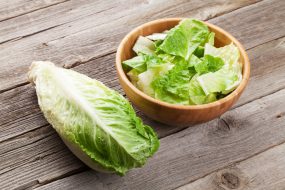
CDC is updating its warning to consumers. It advises that U.S. consumers not eat and retailers and restaurants not serve or sell any romaine lettuce harvested from certain counties in the Central Coastal growing regions of northern and central California. If you do not know where the romaine is from, do not eat it.
- Some romaine lettuce products are now labeled with a harvest location by region. Consumers, restaurants, and retailers should check bags or boxes of romaine lettuce for a label indicating where the lettuce was harvested.
- Do not buy, serve, sell, or eat romaine lettuce from the following California counties: Monterey, San Benito, and Santa Barbara.
- If the romaine lettuce is not labeled with a harvest growing region and county, do not buy, serve, sell, or eat it.
- Romaine lettuce labeled with a harvest region outside of the three identified counties of the Central Coastal growing regions of northern and central California is not linked to the outbreak. Areas not linked to this outbreak include the desert growing region near Yuma, Arizona; the California desert growing region near Imperial County and Riverside County; the state of Florida; and Mexico.
- If you cannot identify where the romaine lettuce is from, do not buy, serve, eat, or sell it.
- If you purchased romaine lettuce and do not know where it was harvested, do not eat, serve, or sell it. Throw it away.
- This advice includes all types or uses of romaine lettuce, such as whole heads of romaine, hearts of romaine, and bags and boxes of precut lettuce and salad mixes that contain romaine, including baby romaine, spring mix, and Caesar salad.
- Wash and sanitize drawers or shelves in refrigerators where romaine was stored. Follow these five steps to clean your refrigerator.
- If you do not know if the lettuce is romaine or whether a salad mix contains romaine, do not eat it and throw it away.
- Hydroponic or greenhouse-grown romaine lettuce has not been linked to this outbreak.
- Take action if you have symptoms of an E. coli infection:
- Talk to your healthcare provider.
- Write down what you ate in the week before you started to get sick.
- Report your illness to the health department.
- Assist public health investigators by answering questions about your illness.
Advice to Clinicians
- Antibiotics are not recommended for patients with E. coli O157 infections. Antibiotics are also not recommended for patients in whom E.coli O157 infection is suspected, until diagnostic testing rules out this infection.
- Some studies have shown that administering antibiotics to patients with E. coli O157 infections might increase their risk of developing hemolytic uremic syndrome (a type of kidney failure), and the benefit of antibiotic treatment has not been clearly demonstrated.
No comments:
Post a Comment